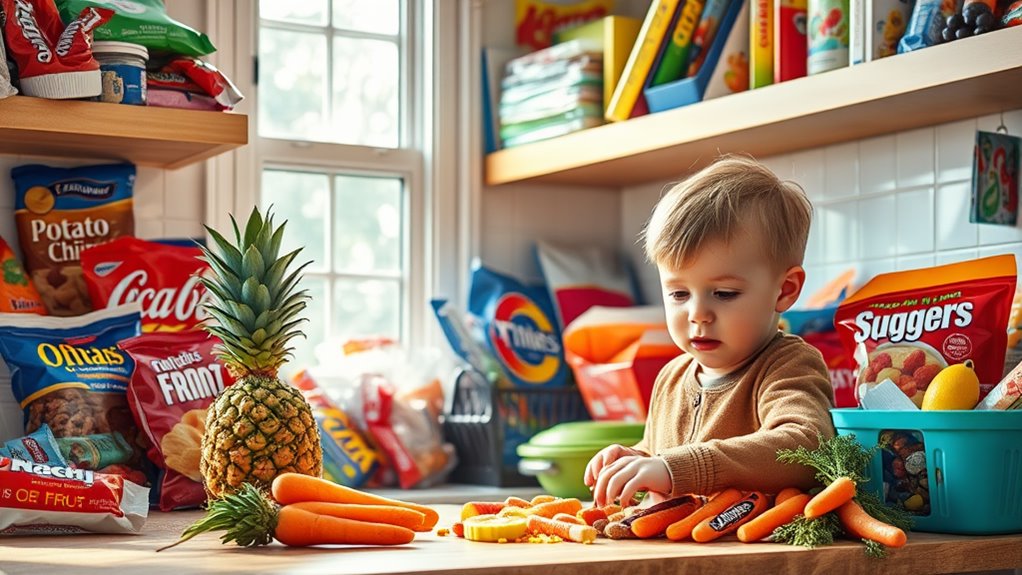The Surprising Link Between Nutrition and Your Child’s Learning
Nutrition plays a crucial role in your child’s learning abilities and cognitive development. A balanced diet rich in omega-3 fatty acids, antioxidants, and essential vitamins supports brain function and memory. Foods like fruits, vegetables, and whole grains provide the energy needed for focus and concentration. On the flip side, poor nutrition can lead to cognitive impairment and emotional issues, making learning harder. Establishing healthy eating habits early on can have long-lasting benefits, fueling your child’s growth in and out of the classroom. There’s so much more to discover about how these choices affect your child’s learning journey.
Key Takeaways
- Proper nutrition, rich in omega-3 fatty acids, supports cognitive development and enhances learning abilities in children.
- Micronutrient deficiencies, such as iron and zinc, can lead to decreased attention span and cognitive impairment.
- A balanced diet with fruits, vegetables, and whole grains fosters brain health and supports lifelong learning.
- Foods high in antioxidants, like blueberries, can boost memory and concentration, improving academic performance.
- Establishing healthy eating habits early promotes sustained energy levels, enhancing focus and learning capacity in children.
Understanding Cognitive Development
Cognitive development in children is crucial for their overall learning and growth. As a parent, you’ll want to be aware of the cognitive milestones your child should reach at different ages. These milestones include skills like problem-solving, memory, and language development. Recognizing these benchmarks can help you support your child’s learning journey effectively.
One of the fascinating aspects of cognitive development is brain plasticity. This means that your child’s brain can adapt and change in response to their experiences. During early childhood, the brain is particularly receptive, forming new neural connections as your child explores the world around them.
You can nurture this plasticity by providing a stimulating environment filled with varied activities that challenge their thinking. Encouraging play, exploration, and interaction with others helps facilitate learning and cognitive growth.
As your child engages in these experiences, they’re not just having fun; they’re also developing critical thinking skills that will serve them throughout life. By understanding cognitive development and recognizing cognitive milestones, you can play an active role in helping your child reach their full potential.
Essential Nutrients for Brain Health
To support your child’s cognitive growth, paying attention to their nutrition is vital. Essential nutrients play a significant role in brain health, and ensuring your child gets the right ones can enhance their learning capabilities. One key nutrient is omega 3 fatty acids, found in fatty fish, flaxseeds, and walnuts. These healthy fats are crucial for brain development, as they help improve memory and cognitive function.
In addition to omega 3s, your child needs a variety of vitamins and minerals. Micronutrient deficiencies, such as lack of iron, zinc, or vitamins B and D, can hinder brain development and cognitive performance. A balanced diet rich in fruits, vegetables, whole grains, and lean proteins can provide these essential nutrients.
Encouraging healthy eating habits early on can help your child establish a strong nutritional foundation for lifelong learning. You might consider incorporating colorful fruits and vegetables into meals, which not only appeal to children but also offer a wide range of vitamins and antioxidants.
Effects of Poor Nutrition
Poor nutrition can have a profound impact on a child’s learning abilities. When kids don’t get the essential nutrients they need, the malnutrition consequences can be severe. You might notice that your child struggles to focus in school or has difficulty retaining information. This isn’t just a temporary phase; it can lead to long-term cognitive impairment.
Research shows that deficiencies in crucial vitamins and minerals can hinder brain development, affecting memory and problem-solving skills. For instance, a lack of iron can lead to fatigue and decreased attention span, making it tough for your child to engage in learning activities.
Similarly, inadequate intake of omega-3 fatty acids has been linked to poor academic performance and behavioral issues.
Moreover, poor nutrition can also impact emotional health, leading to anxiety and depression, which further complicates learning. If your child isn’t eating balanced meals, you might be inadvertently setting them up for challenges that could affect their education and overall well-being.
It’s crucial to recognize these effects early on and make changes to support your child’s nutritional needs for better learning outcomes.
Foods That Boost Learning
Nourishing your child’s brain with the right foods can significantly enhance their learning capabilities. Incorporating brain-boosting snacks into their daily diet can make a noticeable difference. Foods rich in omega-3 fatty acids, like walnuts and flaxseeds, support cognitive function. Berries, particularly blueberries, are packed with antioxidants that help improve memory and concentration.
You might also consider adding superfood smoothies to your child’s routine. Blending spinach, bananas, and Greek yogurt creates a delicious, nutrient-dense drink that fuels their brain. Adding a scoop of protein powder can provide lasting energy for those long school days.
Don’t forget about whole grains! Oatmeal and brown rice are excellent sources of complex carbohydrates that release energy slowly, keeping their minds sharp throughout the day. Pair these grains with some sliced fruit or nut butter for an extra boost.
Finally, hydration is key! Encourage your child to drink water regularly, as even mild dehydration can impair cognitive function.
Practical Tips for Parents
While it may seem overwhelming to ensure your child gets the right nutrition for optimal learning, you can implement a few practical strategies to make it easier. Start with meal planning. Dedicate some time each week to outline healthy meals that incorporate brain-boosting foods. This not only saves time but also helps you make sure your child gets a balanced diet.
Don’t forget about snack ideas! Healthy snacks can keep your child energized and focused throughout the day. Consider options like yogurt with fruit, whole-grain crackers with cheese, or veggie sticks with hummus. Having these ready to grab can make a big difference.
Involve your child in the meal planning process. Let them pick out fruits and vegetables during grocery shopping. This can spark their interest in healthy eating and make them more likely to try new foods.
Lastly, keep an eye on portion sizes to avoid overwhelming them. Small, frequent meals can help maintain their energy levels and concentration.
Long-Term Benefits of Healthy Eating
Healthy eating lays the foundation for a child’s long-term success, impacting not just their physical health but also their cognitive development. When you encourage your child to adopt healthy nutritional habits early on, you’re setting them up for a brighter future.
A diet rich in fruits, vegetables, whole grains, and lean proteins can enhance their memory, focus, and problem-solving skills, making learning more effective.
These nutritional habits don’t just influence their immediate academic performance; they also have lifelong benefits. Children who learn to make healthy food choices are more likely to carry those habits into adulthood. This can lead to better overall health, reduced risk of chronic diseases, and improved mental well-being.
Moreover, fostering a positive relationship with food can help your child develop resilience and emotional intelligence, essential skills for navigating life’s challenges.
Frequently Asked Questions
How Does Hydration Impact My Child’s Learning Abilities?
Hydration’s importance can’t be overstated; it directly impacts your child’s cognitive function. When they’re properly hydrated, their focus, memory, and overall learning abilities improve, enabling them to perform better in school and grasp new concepts more effectively.
Can Supplements Replace a Healthy Diet for My Child?
Supplements can’t fully replace a healthy diet for your child. While they may enhance supplement effectiveness, they often can’t ensure proper nutrient absorption. Whole foods provide essential nutrients that supplements alone might not deliver effectively.
What Foods Should Be Avoided to Enhance Focus?
Did you know that 70% of kids struggle with focus due to poor nutrition? To enhance your child’s concentration, avoid processed snacks and artificial additives, as they can negatively impact cognitive function and overall mental clarity.
How Does Sugar Intake Affect Concentration Levels?
Sugar intake can negatively impact your concentration levels. High sugar sources lead to spikes and crashes in energy, resulting in cognitive effects like decreased focus and memory. Moderation is key to maintaining steady mental performance.
Are There Specific Diets Linked to Improved Learning Outcomes?
Imagine your mind as a garden, thriving with the right nutrients. The Mediterranean diet, rich in brain-boosting foods like olive oil, fish, and veggies, can cultivate sharper focus and improved learning outcomes for you and your child.





